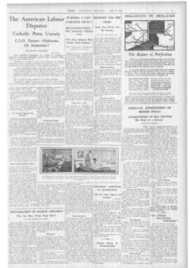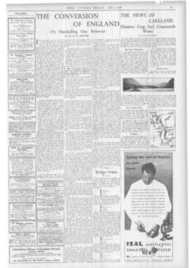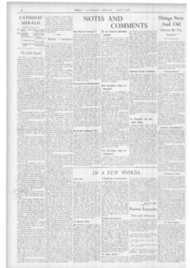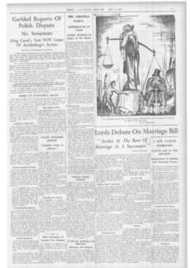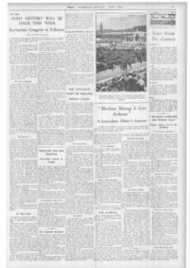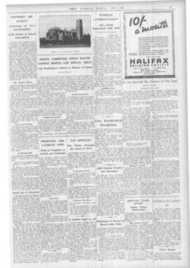Page 9, 2nd July 1937
Page 9
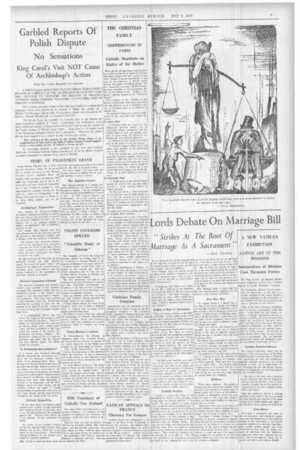
Report an error
Noticed an error on this page?If you've noticed an error in this article please click here to report it.
Tags
Share
Related articles
Catholic Peers And The Marriage Bill
Divorce Bill Given Second Reading In The Lords
Where Were Our Catholic Peers?
Marriage And Euthanasia
Defending Religious Rights
Lords ebate On Marriage Bill
" Strikes At The Root Of Marriage As A Sacrament
—Lord Fitzalan.
In the course of the Second Reading of the Marriage Bill on June 24 and 29, only two temporal peers spoke against the Bill, Lord Fitzalan and Lard Salisbury.
Lord Fitzalan began by taking strong exception to Mr. Herbert's statement in the House of Commons that "there is not a single word in the Bill of which Christ would not approve."
"Considering that almost every word in this Bill is contrary to the doctrines and teachings held by the vast majority of Christians," said Lord Fitzalan, "I think that that was a rather absurd statement and also rather a lapse from good taste. I know it has given offence in cer
tain quarters."
Strikes at Root of Sacrament " There are certain features of this Bill," he continued, " which some people think would tend to mitigate the chaos at present existing in matters regarding divorce; but none the less the Bill strikes at the root of marriage as a sacrament.
"At the same time I know there is a very Prevalent feeling that there are certain points in the Bill that should be considered in Committee. I partly share that feeling. At any rate; so far as I am concerned, I do not intend to move the rejection of the Bill on Second Reading. But that must not be understood. as implying that many of us will not find it advisable or necessary to support its rejection on the Third Reading when we come to it.
" This Bill treats marriage as a question of convenience and sentiment. It ignores the fart that in the minds and hearts of the vast majority of Christians throughout the world, marriage is a sacrament ordained by God: that it is not to he treated according to the whims and fancies of popular opinion changing from time to time. but should be governed by clearly defined, definite ecclesiastical authority rigidly enforced.
Catholic Position "I know, of course, that those of the communion to which it is my privilege to belong enjoy an enviable position in this respect. We have authority to guide us, a fact apparently and unfortunately not to be found elsewhere, and if we should have difficulties as to the interpretation we put, let us say, for example, on St. Matthew's Gospel, which is so often disputed in this connection, we know where to go to be told definitely what our Church teaches. Because we are helped and governed by this authority. some think we ought to stand aside and not endeavour to press our views on others. That would be a perfectly tenable position for us to take up. This bill is not compulsory; no compulsion can be exercised on my communion. with refer
ence to it; and therefore we are perfectly free, if we choose so to do, to say: ' Do you your worst; it has nothing to do with us.' But we share the opinion of many, not of our own denomination but of other denominations, who regard this question as interfering gravely with the sanctity of marriage, and we take our side and join with them in doing all we think right and proper with regard to our criticism and opposition to the Bill."
After showing cause to doubt that the Bill was enthusiastically supported in the country, Lord Fitzalan continued:
Five Year Ban
" As regards Clause I, I should like to say that, as at present advised and subject to what may transpire in Committee, if this Bill obtains a Second Reading, which God forbid! I should be glad to find that clause still in the Bill unaltered. 1 am aware that it is said, I think in America, that it would lead to what are called in America 'companionship marriages.'
" Well, that may be, and would be deplorable, but none the less I believe Clause I will tend to diminish divorces, though the rest of the Bill I fear will tend to increase them."
The speaker then expressed his view that the evil of collusion should be dealt with by an ad hoc measure, and ended with the following warning of the logical conclusion of the views adopted in the Bill: " The promoters of this Bill seem to think that it is going to settle the question for a long time—for a quarter of a century it has been suggested. Well, and what is going to happen then? The slippery slope is again going to be greased, and the way it will lead us God only knows. I cannot help feeling that the time has come when we should check this tendency.
Children
" What about children? We people in England are very fond of our children. The increase in the number of divorces must be doing a great deal of harm to the children. It creates an atmosphere which they cannot get clear of, they must hear about it often, and that must familiarise them with the idea of divorce.
"Again take those cases where there are already children of parents seeking divorce. It entirely deprives those children of any proper idea of home or family life.
" Sometimes I wonder whether, if this tendency to divorce continues to increase, there may not be a revulsion of opinion on account of the effect it is having on the character of the nation through the children deteriorating because of it. I only venture to hope and pray that something may happen in the course of the not far distant future that will cause this tendency for divorce to diminish."
blog comments powered by Disqus




